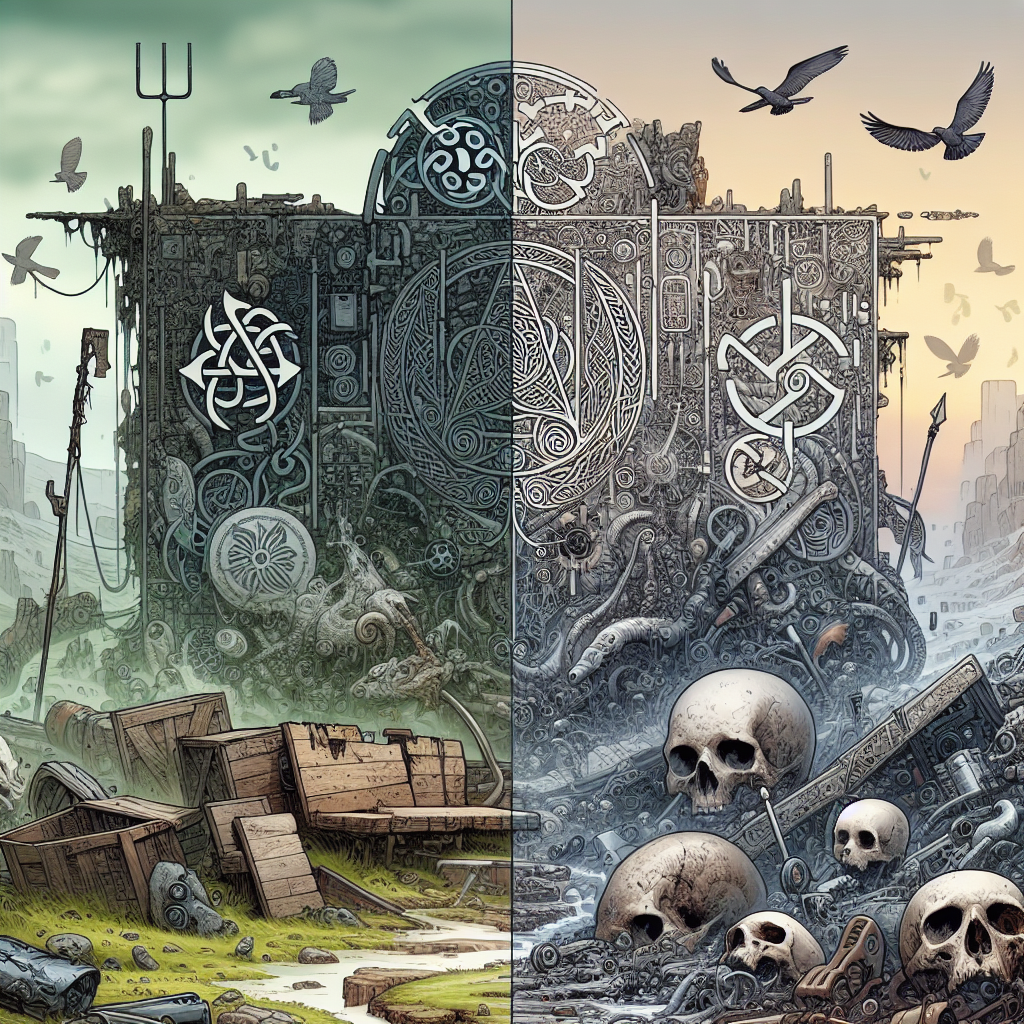Martyrdom in Christianity and Islam possesses distinct meanings and implications, reflecting the diverse religious teachings and practices within these faiths.
The concept of martyrdom in Christianity centers around the belief that martyrs are heroic witnesses who willingly suffer and die for their faith in Jesus. These Christian martyrs view death as gain, as it allows them to be united with Christ and save others. Their approach to martyrdom is non-violent, choosing humble witness and often engaging in missionary work to spread the teachings of Jesus.
In contrast, martyrdom in Islam is strongly associated with the concept of jihad, which translates to “holy struggle.” While Islam condemns suicide, those who sacrifice themselves in the name of Allah are considered martyrs. Islamic martyrdom operations, such as suicide bombings, are seen as a choice made to demonstrate their readiness to die for their beliefs. The Islamic concept of martyrdom is closely linked to the broader concept of jihad and the use of violence against enemies of the faith.
The distinction between Christian and Islamic understandings of martyrdom highlights the differences in their religious teachings and beliefs. Christianity emphasizes peaceful witness and sacrifice, whereas Islam associates martyrdom with a willingness to engage in physical struggle for the sake of defending the faith.
Key Takeaways:
- Christian martyrdom is characterized by a non-violent approach, focusing on humble witness and missionary work.
- Islamic martyrdom is closely connected to the concept of jihad and the readiness to engage in physical struggle for the sake of defending the faith.
- Christian martyrs view death as gain, as it allows them to be united with Christ and save others.
- Martyrdom in Islam is seen as a choice made to prove one’s commitment and willingness to die for their beliefs.
- The differences in martyrdom between Christianity and Islam highlight the contrasting religious teachings and beliefs within these faiths.
Christian Martyrdom
In Christianity, martyrdom is regarded as an act of heroic witness where individuals willingly suffer and sacrifice their lives for their faith in Jesus. Christian martyrs are considered to be following in the footsteps of Jesus, who willingly gave his life to save others. They view death as gain because it allows them to be with Christ in heaven.
Christian martyrs choose non-violent means to bear witness to their beliefs. They often engage in missionary work, sharing the gospel and spreading the teachings of Jesus. Their motivation is driven by love and a desire to bring others closer to God. By living out their faith and facing persecution or even death, they hope to inspire others to follow Christ.
“The blood of the martyrs is the seed of the Church,” as Tertullian famously said. The sacrifice of Christian martyrs throughout history has played a significant role in the growth and perseverance of the Christian faith. Their unwavering commitment to Jesus and their willingness to endure suffering and even death has inspired generations of believers.
| Martyr | Country | Year |
|---|---|---|
| Polycarp | Turkey | 155 |
| Perpetua and Felicity | Tunisia | 203 |
| Dietrich Bonhoeffer | Germany | 1945 |
In Christianity, martyrdom is not just about death but also about the way of life, characterized by selflessness, love, and unwavering faith. It is a testament to the devotion believers have for their Lord and Savior, Jesus Christ.
Islamic Martyrdom
In Islam, martyrdom holds a different meaning and is associated with the concept of jihad or holy struggle. Muslims believe in the importance of defending and spreading their faith, and martyrdom is seen as the ultimate sacrifice in this endeavor. Islamic martyrs are admired for their willingness to give their lives for the sake of Allah and the greater good of the ummah, or Muslim community.
The Quran states, “And say not of those who are slain in the way of Allah, ‘They are dead.’ Nay, they are living, though you perceive it not.” This verse emphasizes the belief that martyrdom does not signify the end of life, but rather the beginning of eternal life in paradise. Islamic martyrs are believed to be rewarded with a special place in paradise, where they will experience the greatest blessings and pleasures.
“Verily, Allah has purchased of the believers their lives and their properties for (the price) that theirs shall be the Paradise. They fight in Allah’s cause, so they kill (others) and are killed.” – Quran (9:111)
Martyrdom in Islam is often associated with acts of self-sacrifice, such as suicide bombings, that are carried out to defend and protect the Islamic faith. While such actions are controversial and condemned by many Muslims, those who support martyrdom operations believe that they are justified in the context of defending Islam against perceived threats and oppression.
It is important to note that the concept of martyrdom in Islam, particularly in relation to jihad, has been subject to various interpretations and debates within the Muslim community. While some argue that martyrdom should only be understood as dying while defending against an aggressor, others believe that acts of violence against innocent people cannot be justified under any circumstance. These differing views highlight the complexities and nuances surrounding the topic of martyrdom in Islam.
| Martyrdom in Christianity | Martyrdom in Islam |
|---|---|
| Christian martyrs are regarded as heroic witnesses who are willing to suffer and die for their faith in Jesus. | Islamic martyrs are admired for their willingness to give their lives for the sake of Allah and the greater good of the ummah. |
| Christian martyrs are non-violent and choose humble witness to Christ, often through missionary work. | Martyrdom in Islam is often associated with acts of self-sacrifice, such as suicide bombings, that are carried out to defend and protect the Islamic faith. |
| In Christianity, martyrdom is seen as a way of joining Jesus in dying to save others and gaining eternal life in Christ. | In Islam, martyrdom is believed to be the beginning of eternal life in paradise, where martyrs are rewarded with special blessings and pleasures. |
The distinction between Christian and Islamic martyrdom illustrates the stark differences in the religious teachings and beliefs of these two faiths. While Christian martyrs embody non-violence and sacrifice for the sake of others, Islamic martyrs are revered for their readiness to defend and uphold their faith, even if it means resorting to acts of violence. These divergent notions of martyrdom reflect the unique historical, cultural, and theological contexts in which Christianity and Islam have developed over centuries.
Martyrdom in Christianity vs Islam
By exploring the distinct teachings and beliefs of martyrdom in Christianity and Islam, we can uncover the disparities in their interpretations and significance.
In Christianity, martyrdom is seen as a courageous act of faith, with martyrs considered heroic witnesses. These individuals willingly suffer and even die for their belief in Jesus. Christian martyrs join Jesus in his sacrifice, viewing death as gain because it allows them to be with Christ. Their martyrdom is non-violent and is often expressed through acts of humble witness, such as missionary work.
On the other hand, martyrdom in Islam is associated with the concept of jihad, which means holy struggle. While suicide is condemned in Islam, those who sacrifice themselves for Allah are regarded as martyrs. Islamic martyrdom operations, such as suicide bombings, are seen as a choice made to prove their readiness to die for their beliefs. The Islamic concept of martyrdom is intricately linked to the broader concept of jihad and the use of violence against enemies of the faith.
The distinction between martyrdom in Christianity and Islam highlights the significant differences in their religious teachings and beliefs. While Christian martyrdom focuses on self-sacrifice and humble witness, Islamic martyrdom is often associated with violence and the struggle for the faith. These distinct interpretations and practices of martyrdom reflect the unique contexts and values within each religion.
| Christian Martyrdom | Islamic Martyrdom |
|---|---|
| Martyrs seen as heroic witnesses | Martyrs considered those who die for faith |
| Non-violent acts of humble witness | Martyrdom linked to the concept of jihad |
| Death viewed as gain to be with Christ | Sacrifice for Allah seen as a choice |
In conclusion, the differences in martyrdom between Christianity and Islam are rooted in their distinct teachings and beliefs. Christian martyrs are admired for their self-sacrifice and humble witness to Christ, while Islamic martyrs are associated with the struggle for the faith and the use of violence. Understanding these disparities is crucial in fostering interfaith dialogue and promoting a deeper appreciation for the diverse religious traditions that exist in our world.
Conclusion
The differences in martyrdom between Christianity and Islam reflect the contrasting religious teachings and beliefs, further highlighting the unique perspectives within these faiths.
In Christianity, martyrdom is seen as a noble and heroic act of sacrifice. Christian martyrs willingly suffer and die for their faith in Jesus, following his example of selflessness and love. They believe that by joining Jesus in his suffering and death, they can save others and gain eternal life with Christ. Christian martyrdom is characterized by non-violence and the humble witness to Christ, often through missionary work that aims to spread the message of love and salvation.
In contrast, martyrdom in Islam is associated with the concept of jihad, which means holy struggle. While suicide is condemned in Islam, individuals who sacrifice themselves for the sake of Allah are considered martyrs. Islamic martyrdom is often linked to the idea of martyrdom operations, such as suicide bombings, which are seen as a choice made to demonstrate readiness to die for their beliefs. The Islamic concept of martyrdom is closely tied to the broader concept of jihad, which includes the use of violence against enemies of the faith.
The distinction between Christian and Islamic martyrdom underscores the divergent interpretations and practices within these religions. Christian martyrdom emphasizes self-sacrifice for the sake of others and the spread of the Gospel, while Islamic martyrdom is connected to the defense of the faith and the concept of holy struggle against perceived enemies. Understanding these differences is crucial for promoting dialogue and fostering mutual respect among followers of different faiths.
FAQ
What is the difference between martyrdom in Christianity and Islam?
The concept of martyrdom differs significantly in Christianity and Islam. Christian martyrs are regarded as heroic witnesses who are willing to suffer and die for their faith in Jesus, joining him in dying to save others. On the other hand, Islamic martyrdom is associated with the concept of jihad or holy struggle, where those who sacrifice themselves for Allah are considered martyrs.
How do Christian martyrs view death?
Christian martyrs consider death as gain because it allows them to be with Christ. They choose humble witness to Christ through non-violent means, often through missionary work, and see their martyrdom as a testament to their faith in Jesus.
What is the relationship between martyrdom and jihad in Islam?
In Islam, martyrdom is linked to the broader concept of jihad, which is the Holy struggle for the sake of Allah. While suicide is condemned in Islam, those who sacrifice themselves for Allah are considered martyrs. Islamic martyrdom operations, such as suicide bombings, are seen as a choice made to prove their readiness to die for their beliefs.
How do Christian beliefs on martyrdom differ from Islamic beliefs?
Christian martyrdom is rooted in the willingness to suffer and die for their faith in Jesus, emphasizing non-violence and humble witness. Islamic martyrdom, on the other hand, is connected to jihad and the readiness to use violence against enemies of the faith, highlighting a fundamental difference in their religious teachings and beliefs.
 Skip to main content
Skip to main content


